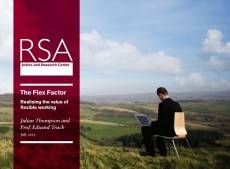July 16, 2013
RSA report claims untapped flexible working benefits of £8bn for the UK
 The latest salvo in the battle to get Britain to adopt even more flexible working comes in a report that carries more weight than some because it is not solely the work of a technology company but sponsored by the Royal Society for the Encouragement of Arts, Manufactures and Commerce (RSA). True, it’s co-sponsored by Vodafone but that is the way of these things. The RSA study estimates that flexible working practices shaped around the personal circumstances of the individual and designed to minimise the routine grind of commuting could give people around 5 more hours per week in which to work.
The latest salvo in the battle to get Britain to adopt even more flexible working comes in a report that carries more weight than some because it is not solely the work of a technology company but sponsored by the Royal Society for the Encouragement of Arts, Manufactures and Commerce (RSA). True, it’s co-sponsored by Vodafone but that is the way of these things. The RSA study estimates that flexible working practices shaped around the personal circumstances of the individual and designed to minimise the routine grind of commuting could give people around 5 more hours per week in which to work.





















June 12, 2013
Real demographic challenge as number of older workers tops one million
by Sara Bean • Comment, Legal news, News, Workplace
The latest employment figures published today by the Office for National Statistics (ONS) show an interesting demographic trend. Beneath the rather unexceptional news that employment rose by 24,000 and unemployment fell by 5,000 in the three months to April, is what Jim Hillage, Director of Research at the Institute for Employment Studies (IES) describes as “underlying structural changes in the labour market”. The number of employed people over 65 in the UK has now reached more than a million (1,003,000), the highest since records began in 1971. This means that almost one in ten of over-65s are now in work.
(more…)